|
|
|


|
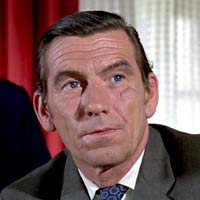 |
|
Image © ITV Studios, 1969 |
| |
Anthony Baird
Character & Episode:
Hamilton in A Sentimental Journey
Born: 01/01/1919, Hillhead, Glasgow, Lanarkshire,
Scotland (as Antony Broderick Baird)
Died: 27/08/1995, Westminster, London, England
Born in Glasgow, Anthony Baird first moved
to London in 1936 after giving up a job as a farm worker. After
a time where he had to sleep rough to make ends meet, he applied
for the Leverhulme Scholarship at the Royal Academy of Dramatic
Art (RADA) and was successful. He broke his training as an actor
to join the Army after the outbreak of the Second World War, and
was stationed in Dover throughout its long bombardment before he
was discharged on medical grounds. Eventually, he returned to
Scotland, where, on the Edinburgh stage in a non-speaking role,
he was spotted by a talent scout from Ealing Studios, who
persuaded Anthony to travel to Ealing for a film test. He made his
big screen debut in the classic Michael Balcon ghost story
Dead of Night in 1945, the same year as he also made a film
short Bothered by a Beard, in which he played a customer
of the demon barber, Sweeney Todd. Anthony enjoyed a long
career in film and television, working until 1989.
His main film
credits were in Passport To Treason (1956) and The Ipcress
File (1965) which starred Michael Caine. On television, he
appeared in The Avengers (1962 and 1963), played Mr Pearson in
Crossroads from 1964 and later appeared in Queenie's
Castle in 1970. One of his last screen appearances was in
the film Cheetah in
1989. During the course of his career, he was credited with
several spellings of his first name, beginning as 'Antony',
changing to 'Anthony' around 1960 (though many credits were
still given as 'Antony'), with his final credit being as simply
'Tony'. He was even credited as 'Anthonay' for his contribution
to the TV mini-series The Flame Trees of Thika, a
typographic error if ever there was one!
Anthony married Evelyn Millicent Amelia
Hardwick (1919-2007) in Croydon, Surrey, on 13th January 1940.
The couple had four children: Patricia, Antony, Peter and
Felicity. Despite this, Anthony lived
for three years from 1958 with Carry On actress Joan Sims
(1930-2001). Joan's parents did not approve of the relationship.
After Joan told her mother during a visit that she was living
with Tony, her father wrote her a stern letter, condemning the
relationship. Joan replied, telling her parents that they had to
come to terms with Tony being an extremely important part of her
life. For the next six months she had no contact with her
parents. However, Joan was a devoted daughter and found the
separation from her parents difficult. She continued living with
Tony, but the relationship floundered and the pair eventually
split. Joan said that it was due to her success and Tony's
failure as an actor, though the parental disapproval did not
help matters. Joan would never marry, though Tony later did. He
made one appearance in a Carry On film - he played a
guard in Carry On Spying (1964) - though this went before
the camera several years after the end of his relationship with
Joan.
Anthony is arguably best remembered for his
role in the horror portmanteau Dead of Night
(1945) as Hugh Grainger, though he also featured in guest roles
in The Avengers and Danger Man on television.
|
|
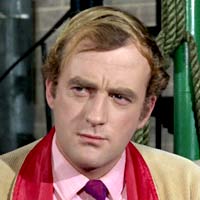 |
|
Image © ITV Studios, 1969 |
| |
Simon Barnes
Character & Episode:
Man with Cards in That's How Murder Snowballs
Born: 13/09/1939 (as Simon Peter Barnes)
Died: 28/10/2006, Landovery, Carmarthenshire, Wales
Simon Barnes was an actor and
writer who, for the greater part of his career, devoted the
greater part of his time to the Landovery Theatre Company, of
which he was a director, having founded it in 1975. He not only
ran the theatre for thirty years, he renovated the building he
had chosen for it and helped equip it.
He trained with the Actors'
Workshop in London and began his career in 1962 on a wage of £7
a week as a member of the Colchester Repertory Theatre. He
excelled there, rose to the position of stage manager (albeit
with no increase in salary!) and met his future wife Jacqueline
'Jacky' Harrison (1936- ), an actress who had made a cameo appearance in
Kubrick's Lolita (1962).
By 1973, having worked in several
reps and infrequently on screen, his interests turned to writing
for the theatre and television. To begin with, produced and
performed his own childrens series for Greenwich Cablevision,
Free For All. He also won a BBC Radio drama competition, and
wrote a number of plays and scripts.
Simon then left London to pursue his writing career and, with
Jacky, moved to Wales, where they bought and restored a derelict
cottage in Llandovery. Two years later, he located a suitable
venue - the Old Institute - and founded the Landovery Theatre
Company. Once upon and running, he pioneered the Landovery Drama
Festival comprised of new plays. He wrote and produced in excess
of twenty plays for the company, acted regularly, and inspired
many to go into careers in acting, production and direction.
Among his writing for the
Landovery company he wrote a series of ‘radio’ plays, performed
on stage by actors in dinner jackets, in the style of early
radio. His performance in this comedy series – as C.P. the
eccentric actor manager, trying to keep his ailing, poverty
stricken theatre alive and kicking – reflected much of what he
had been through with the Llandovery theatre over many years.
His screen credits are few, with
currently less than a dozen identified. That's How Murder
Snowballs appears to have been only his second credited role
on television, the first being in an episode of the soap opera
Honey Lane in January 1969.
He had previously worked as a screen extra, though currently his
only known appearance in such a role is in a 1963 episode of the
police drama No Hiding Place called No Previous
Convictions. Probably his most prominent screen role was as a regular in Dave
Allen’s comedy series in 1972, though he also appeared in
Play for Today (1970) and Justice (1971).
Simon was diagnosed with cancer in
2003. After surgery which appeared to facilitate a full
recovery, the disease returned in early October 2006 and he had
succumbed to it at age 67 by the end of the month. His wife
Jacky was with him at the end.
|
|
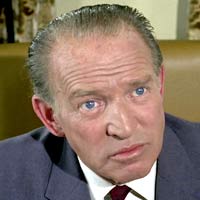 |
|
Image © ITV Studios, 1969 |
| |
Patrick Barr
Character & Episode:
Philip Yateman in You Can Always Find a Fall Guy
Born: 13/02/1908, Akola, India (as Patrick David
Barr)
Died: 29/08/1985, Wandsworth, London, England
Indian born Patrick Barr's father
was a judge, though after retirement he would become a
theatrical manager. Patrick was educated at Radley College and
later went to Oxford University. In 1929 he won a blue in the
University Boat Race. Leaving university, Patrick first went
into engineering; he would not turn to acting until he was 24.
He soon made his first screen appearance in 1932 when he played
a torturer in The Merry Men of Sherwood, a short film for
the Delta company. He would appear in a number of films and
television productions leading up to the outbreak of the Second
World War. Patrick would also have a long stage career. He made
his West End stage debut in 1936 in The Country Wife
staged at the Old Vic. A year later, he would appear on stage in
New York. During the war, Patrick, a conscientious objector,
served with the Free French Ambulance Unit in North Africa. For
his bravery, he was awarded the Croix de Guerre. It was while in
Africa that he met his wife Jean Williams, whom he would marry
after just ten days.
After the war, he resumed his acting career
and would appear regularly in the West End for the next 15
years. He also appeared in several notable films during the late
Forties and the Fifties such as The Blue Lagoon (1949),
The Lavender Hill Mob (1951) and The Dam Busters
(1955). He also appeared in a number of television shows and
would twice win the Television Actor of the Year award,
increasing his standing as an actor and opening the door to
better roles and higher pay. In the Sixties, he appeared in a
number of films and well known television series, including
The Avengers (Take Me to Your Leader), Doctor Who
(The Moonbase) and Department S (The Bones of
Byrom Blain). He continued to be busy during the Seventies,
appearing in the horror film The Satanic Rites of Dracula
(1973) and The First Great Train Robbery (1978), as well
as in numerous television shows. One of his last roles was in
the 1983 James Bond film Octopussy. Sadly, Patrick would
die two years later in 1985. He had a daughter Belinda, who was
also an actress.
|
|
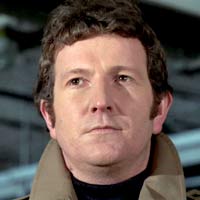 |
|
Image © ITV Studios, 1969 |
| |
Keith Barron
Character & Episode:
Jarvis in When Did You Start To Stop Seeing Things?
Born: 08/08/1934, Mexborough, West Riding of
Yorkshire, England
Died: 14/11/2017, England
Keith Barron was born in Mexborough, in
what is today South Yorkshire, to Zillah (née Rothery) and
Alexander Barron, a wholesale provisions supplier. On leaving
Mexborough Technical College, he went into the family business
but had ambitions to act that had been inspired by childhood
visits to local music halls. He gained experience with
Mexborough Theatre Guild’s amateur dramatics company alongside a
future fellow actor (and Randall and Hopkirk guest
star), Brian Blessed.
In 1961, Keith decided to widen his acting
experience and sought roles in television. Among his first roles
were three
December 1961 appearances: in the John Hopkins serial A Chance of Thunder
on the 13th, a BBC North play, The Night of the Match, a
day later, and finally Dragonsfield, an episode of the
first series of The Avengers on the 30th. The following
year he became well-known to UK television viewers as the
easy-going Detective Sergeant Swift in the Granada TV series
The Odd Man and later its spin-off It's Dark Outside.
His major breakthrough, however, was as Nigel Barton, an avatar
of the writer Dennis Potter in his plays Stand Up, Nigel
Barton and Vote, Vote, Vote for Nigel Barton in
BBC1's The Wednesday Play (1965) anthology series – he
later played a very similar character in Potter's Play For
Today offering Only Make Believe (1973).
Back in the Sixties and Seventies, Keith
appeared in a number of well-known series including The
Further Adventures of Lucky Jim (in the title role, 1967),
Strange Report (1969), Armchair Theatre (two
plays, 1964 and 1973) and No Strings (1974). He made two
appearances in Upstairs, Downstairs (1974) as Australian
Gregory Wilmot. In the 1980s he had a prominent role in the
Doctor Who serial Enlightenment, which starred Peter
Davison as the Doctor. He also did many voice-overs on British TV
commercials. In 1989 he starred on television in a moving story
of relationships in a Midlands new town, Take Me Home,
with Annette Crosbie as his wife and Maggie O'Neill as his
girlfriend.
On the big screen, he appeared in Baby
Love (1969) and the David Puttnam film Melody (1971)
as Mr Latimer. One of his best-loved and best-remembered roles
was in the 1980s sitcom Duty Free, though he would come
to regret the role as the series' success led to him being
pigeonholed as a comedy actor when he had proved himself more
than capable of serious roles too. In the 1990s he co-starred in
the sitcoms Haggard (1990-92) and All Night Long
(1994). In the 2000s he was a regular character on the ITV
Sunday night drama Where the Heart Is (2000-04).
Keith remained busy right up to shortly
before he died. He appeared as himself as the guest celebrity in
dictionary corner on several episodes of the Channel 4 words and
numbers game Countdown. He was the star on Bunn and
Co., a radio show that was broadcast from March 2003 to
April 2004 on BBC Radio 4. An appearance on the BBC's Test
the Nation IQ test show on 2nd September 2006 gave him an IQ
of 146. Keith’s last television role was in Not Going Out
early in 2017. Keith had appeared in nearly two hundred film and television productions and was a familiar face
on television for almost forty years.
In his personal life, Keith married Mary
Pickard, a stage designer, in 1959, a relationship that endured
until his death after a short illness in 2017. The couple had
two sons, Jamie, who became an actor, and Mark. Mark works as a writer, under the name
Mark Dawson. In the early Eighties, Keith had managed a
restaurant in Hayle, Cornwall, and in his later years he lived
in the Surrey town of East Molesey.
|
|
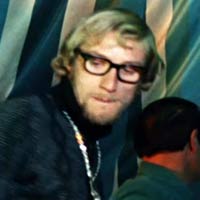 |
|
Image © ITV Studios, 1969 |
| |
Sean Barry-Weske
Character & Episode:
Dancer in Whoever Heard of a Ghost Dying?
Born: 02/03/1940, London, England (as Sean Barry
Weske)
Died: 26/12/2004, California, USA
Sean Barry-Weske was a minor actor, often
uncredited, with fewer than two dozen screen credits to his
name. However, his father was a well-known stage
and silent film actor Victor Weske (1899-1960) and his mother a
member of the Ricardo Sisters act, Rita Tobin-Weske (1906-1987),
His brother Brian Weske (1932-2001) was also an actor,
songwriter and personal assistant to close friend and actor
Michael Caine. Like his brother, Sean led an interesting life;
as well as being an actor he was a trained photographer and
worked a lot in Europe and Hollywood in America.
Although he began to appear in films as an
infant, it wasn't until he was a little older that he made his
debut as a professional actor. He firstly acted under stage name
Sean Barry, but later adopted the stage name Sean Barry-Weske. Most of his
screen work saw him employed as an extra, but he did appear in such
television series as Dixon of Dock Green, Harry Worth
and The Champions (as a hitch-hiker in two episodes)
and in background roles in such films as The Magic Christian,
Morons from Outer Space and The Krays.
In the late Sixties he, in partnership with
John Kavan, formed a theatrical agency in London, and went with
his own company, Sean Barry Productions, to Italy for making of
films. He would later form the British Motion
Picture Company with George McIndoe and former Oliver!
actor Jack Wild. Sean would form and dissolve a number of
production companies after this.
A student of German Military
History, Sean also worked as advisor on many war movies and
television dramas. He is also remembered for being the last
photographer to photograph the actress Sharon Tate shortly
before she was tragically murdered in 1969.
In his personal life, Sean was married to
Cheryl Anne McKelvey (1955- ) from 1992 until his death in 2004.
|
|
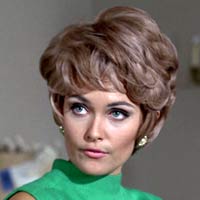 |
|
Image © ITV Studios, 1969 |
| |
Alexandra Bastedo
Character & Episode:
Carol Latimer in Whoever Heard of a Ghost Dying?
Born: 09/03/1946, Hove, East Sussex, England (as
Alexandra Lendon Bastedo)
Died: 12/01/2014, Worthing, West Sussex, England
Alexandra Bastedo was a stunning beauty – Monty
Berman compared her to the Hollywood starlet Grace Kelly. According to Alexandra, her
mother was of French, German and Italian descent and her
Canadian-born father was of Spanish, Dutch, Scottish and native
Indian extraction. As a child she attended Brighton and Hove
High School and Worthing School of Drama, gaining nine O level
and four A level certificates. She was noted for her
multilingual skills, speaking Italian, Spanish, French and
German. These skills brought her to the Prime Minister's offices
at 10 Downing Street
to assist with translations and landed her the role of
co-presenter of Miss World competitions with Peter
Marshall in the 1980s.
As an actress she will always be
remembered for her role as Sharron Macready in the 1968 British
espionage/science fiction adventure series The Champions,
for which she was reputedly paid just £100 an episode. She
also figured in several other ITC series in guest roles,
including two episodes of The Saint (The Crime of the
Century, 1965 and The Counterfeit Countess, 1967),
Department S (The Man Who Got a New Face, 1969),
Jason King (Variations on a Theme, 1971) and The
Adventurer (Action!, 1972).
She has been cited as a
sex symbol of the 1960s and 1970s, though her image still
persists today and she retains a large fan following. She was
known worldwide as "La Bastedo". Though she never really quite
made it as an actress, Alexandra notched up more than fifty
credited film and television appearances. She had made her debut
in the 1963 comedy thriller 13 Frightened Girls!, having
gained the role after winning a competition to appear in the
film, beating 4,000 other entrants. At this time in her life she
had wanted to become a vet. Several roles for the BBC followed,
including what was arguably her big acting break, as Lindy
Carroll in the popular BBC1 soap opera Compact (1965)
alongside Frances Bennett (But What a Sweet Little Room)
and Ronald Allen. Over the next couple of years, she had a few
minor roles in such films as Doctor in Clover (1966),
That Rivera Touch (1966) with comedians Eric Morecambe and
Ernie Wise, and the chaotic James Bond spoof Casino Royale
(1967). Later she was cast as Diana Dalzell in the drama
series Codename (1970) which starred Clifford Evans in the lead
role and she rounded off a busy decade by starring in the
Michael Bird thriller serial The Aphrodite Inheritance
for the BBC. Although she virtually retired in 1980 she would
occasionally make cameo appearances and play minor roles on
television and in films (for instance she appeared in an episode
of Absolutely Fabulous playing a 1960s model associate of
Edina and Patsy, and in 2005 had a small role in the blockbuster
Batman Begins). In 1991 she appeared in a notable stage
production of the psychological thriller Dangerous Obsession
by N.J. Crisp, opposite Marc Sinden and John Challis, at The
Mill, Sonning. Her final screen appearance was in EastEnders
in 2008 when she played a character called Cynthia.
In 2002 she
appeared in the documentary Where Are They Now, a
documentary which gave an insight into her private life. She was
once the president of her local RSPCA branch, but gave up her
position in 2008 so she could dedicate more time to her own fast
growing animal sanctuary at her home in West Chiltington, West
Sussex. Alexandra wrote a memoir, Beware Dobermanns, Donkeys
and Ducks, as well as several books on caring for cats and
dogs. She was a lifelong vegetarian and patron to a number of
animal welfare organisations including Compassion in World
Farming, Wildlife Aid Foundation, National Animal Welfare Trust,
Greyhounds in Need, and Natu. Before she married Patrick Garland
in 1980, Alexandra had dated David Frost and Omar Sharif but
turned down the advances of Steve McQueen who, she recalled,
propositioned her with the line, "My wife doesn't understand
me." In the case of Sharif, the liaison lasted only a few weeks
because of the actor's bridge-playing habit, his odd hours, and
the fact that he took telephone numbers from other women. Her
husband Patrick died in 2013 and Alexandra tragically succumbed
to cancer the year after.
|
|
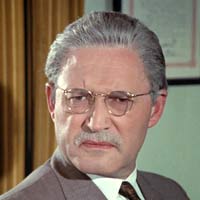 |
|
Image © ITV Studios, 1969 |
| |
David Bauer
Character & Episode:
Doctor Conrad in A Disturbing Case
Born: 06/03/1917, Chicago, Illinois, USA (as Herman
Bernard Waldman)
Died: 08/02/1973, London, England
David Bauer was an American-born actor, who
grew up in St. Louis, and was chosen as the most promising actor
in his year at Washington University. Following his graduation
in the summer of 1938 he received a scholarship to the Berkshire
Playhouse School in Massachusetts and started working as a
professional actor. He worked in radio and on the stage before
joining the U.S. Army during the Second World War. After demob,
he returned to acting.
His film debut came with a background role
in the American courtroom drama The Vicious Circle
(1948). However, soon after this engagement, he adopted the
stage name David Wolfe and began to play more notable roles on
the big screen, beginning with The Undercover Man (1949).
He went on to appear in more than two dozen films over the next
few years. However, this promising start was halted in 1953 when
he became a target of the anti-Communist witch hunt which swept
America from the late 1940s and through the Fifties and led to
the blacklisting of actors and other creatives. Many chose to
leave the country and work elsewhere, but David bided his time
and after a while resumed acting under the stage name David
Bauer. In 1958, he left the USA.
America's loss proved
to be Britain’s gain as he soon became popular on British
screens, often playing businessmen or professional officials. In
his British career, during which he amassed close to one hundred
television and film credits, David appeared in such series as
The Saint (five roles between 1962 and 1967), The
Avengers (1964 and 1966) and The Prisoner (1967). In
1968 and 1969 he was featured as the narrator of the weekly regular
character introductions for the popular ITC series The
Champions. On the big screen, he made appearances in films
including The Spy Who Came in from the Cold (1965), Inspector
Clouseau (1968) and the war film Patton (1970), which
featured George C. Scott. David also had minor roles in the
James Bond films You Only Live Twice (1967) and
Diamonds Are Forever (1971).
In his personal life, he was twice married.
His second wife was British actress Stella Tanner (1925-2012).
Stella is well remembered for her contributions to many television
programmes which included Spike Milligan's surreal comedy sketch
show Q (notably the
Pakistani Dalek skit) and the Waldorf Salad episode of
Fawlty Towers. The couple had one child, their daughter
Alexa, who became an actress and disc jockey. Sadly, David died
at the relatively young age of 55 in 1973.
|
|
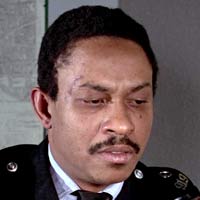 |
|
Image © ITV Studios, 1969 |
| |
Norman Beaton
Character & Episode:
Policeman in Money to Burn
Born: 31/10/1934, Georgetown, Guyana (as Norman
Lugard Beaton)
Died: 13/12/1994, Georgetown, Guyana
Norman Beaton was an actor who found fame
as Desmond Ambrose in the successful Channel 4 situation comedy
Desmond’s, which ran from 1989 until 1994. Norman was born in Georgetown in Guyana and attended
the Queen's College until he was expelled for truancy and poor
grades. Norman though would make amends as he later attended the
Government Teachers' Training College and graduated with
distinction.
Initially, Norman seemed more
interested in music and he was a member of a calypso band called
The Four Bees. He was a good calypso singer scoring a Number 1
hit in Trinidad and Tobago with Come Back Melvina in
1959. In 1960 though he moved to London, working in a shipping
department of a bookshop. Norman later qualified as a teacher,
becoming the first black teacher to be employed by the Liverpool
Education Authority. It was a career he did not enjoy and in his
spare time started to write plays and would gain some success on
stage.
As a result of his writing he
decided to give acting a go and worked initially in Bristol, but
later moved to Sussex, where he played the leading role in a
musical he had written, Sit Down, Banna at the Connaught
Theatre. Norman made his television debut in 1967 in The
Wednesday Play. His career would be mainly based in
television.
His contribution to the Randall
and Hopkirk (Deceased) series was as a Police desk sergeant
and accounts for only a few seconds of screen time. This was common for many
of Norman’s early roles. In the early 1970s, Norman began to
perform in plays in London's West End. In 1970 he played the
role of Ariel in Shakespeare's The Tempest, which he
described in his autobiography as "the most important role of my
acting career." In 1975, he helped to establish the Black
Theatre of Brixton. In the same year, Norman played Nanki-Poo in
The Black Mikado, a modern version of Gilbert and
Sullivan's The Mikado.
His real breakthrough role came in
the family comedy The Fosters, in which he played Samuel
Foster in 1976-77. The series ran to 27 episodes and featured Lenny
Henry, Isabelle Lucas and Carmen Munroe, and was popular and
arguably a forerunner to Desmond’s. He played the lead
role of Willie Boy in the 1987 comedy Playing Away about
a West Indian cricket team invited to play a rural white team.
He appeared as a guest on The Cosby Show in 1991
(episode: There's Still No Joy in Mudville), and in
Little Napoleons. He also appeared in several movies
including The Mighty Quinn (1989).
Sadly, although only in his late
fifties, his health was deteriorating, and he decided to move
back to Guyana. Tragically, he collapsed in the airport and died
shortly afterwards. Norman had been married three times and had
five children.
|
|
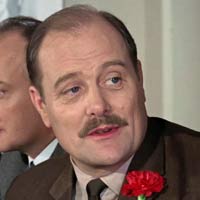 |
|
Image © ITV Studios, 1969 |
| |
Michael Beint
Character & Episode:
Senior Official in Just for the Record
Born: 1925, Swindon, Wiltshire, England
Michael Beint commenced his stage career in
amateur circles and then performed in repertory theatre for
several years. He subsequently became associated with the
National Theatre, with whom he worked for a long period. On the
London West End stage, he featured in such productions as You
Prove It, Rule of Three, The Tempest and, in
opera, Dido and Aeneas. He also appeared on Broadway in
Shakespeare’s As You Like It in 1974. Besides his stage
and screen career, Michael also participated in radio plays as
an actor and reader. He also worked on some occasions as a stage
director during his theatrical career.
Michael's early screen appearances were
minor and uncredited, and he first progressed to credited screen
roles on television in the late 1950s. He featured in a number
of notable television productions in the Sixties including
The Avengers (Propellant 23, 1962), Benny Hill
(1963), The Saint (1963 and 1966), Gideon's Way (How
to Retire Without Really Working, 1965) and Adam Adamant
Lives! (Sing a Song of Murder, 1966). He also played
different characters in Dixon of Dock Green between 1964
and 1968. In 1967-1968, Michael played a recurring character in
Champion House, a drama series set in the textiles
industry which starred James Kerry, Edward Chapman and Virginia
Stride. In 1970, he featured in the children's drama serial
Smith, which was about an 18th century boy pickpocket who
was played by child actor Ian Ramsey. Later in his career,
Michael contributed to series such as The Bill (1989),
Poirot (1993) and Doctors (2003 and 2006). His last
screen credit was in the medical drama Casualty in 2010.
On the big screen, Michael's major film
credits include The Witchfinder General (1968), Nuns
on the Run (1990) and Elizabeth (1998). He also
filmed in Vienna for Franco Zeffirelli's Romeo and Juliet
(1968).
While there, he also took the opportunity to work in Viennese
theatre, appearing in Terence Rattigan's In Praise of Love.
In his personal life, Michael has been
married to Doreen Williams (1925-) since 1948 – the couple
celebrated their 70th wedding anniversary in 2018. They have
five children, all of whom went into show business in one way or
another, plus eleven grandchildren and one great-grandchild.
|
|
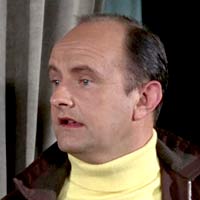 |
|
Image © ITV Studios, 1969 |
| |
James Belchamber
Character & Episode:
Mark in That's How Murder Snowballs
Born: 12/03/1926, Haslemere, Surrey, England
Died: 26/11/2019, Portsmouth, Hampshire, England
James Belchamber studied at the Royal
Academy of Dramatic Arts (RADA) from 1943 and served in the
Royal Armoured Corps from 1944 to 1948. His
television debut came while he was a member of the Glyndebourne Children's Theatre, which staged a
production of Androcles and the Lion at the second
Edinburgh Fringe Festival in the summer of 1948. They
reperformed this play for BBC Television, with the
programme airing on 10th October 1948, during time set aside for
young viewers. Fellow Randall and Hopkirk (Deceased)
actor John Garvin also appeared in this production. Other
notable contributions included The Diary of Samuel Pepys
(1958, alongside Michael Griffiths, Randall and Hopkirk's
Inspector Nelson), Z Cars (1963), The Saint (1964)
and The Avengers (Quick-Quick Slow Death in 1966
and Get-A-Way! in 1968). His television work was
restricted to bit parts, though he was engaged for meatier roles
on occasion in the theatre.
After the Sixties, James' screen credits
became less frequent, with just three television credits in The
Upchat Line (1977), Play for Today (Not for the
Likes of Us, 1980) and Great Expectations (1981) prior
to his last known appearance in 1984 in an episode of
Miracles Take Longer.
After a sixty-year relationship with fellow
actor Bernard Archard (1916-2008), the couple entered a civil partnership in 2006.
James passed away at 93 years of age on 26th November 2019 from
pneumonia contracted following leg surgery.
|
|
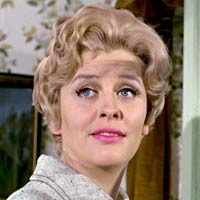 |
|
Image © ITV Studios, 1969 |
| |
Frances Bennett
Character & Episode:
Ann Fenwick in But What a Sweet Little Room
Born: 22/12/1930, India (as Felicité Jan Shirley
Barrington)
Died: 05/03/2014, Denville Hall, Northwood, London,
England
Although born in India,
Frances Bennett came to England with her parents when still an infant.
On leaving school, she would study at RADA (graduating in 1949) and was classically
trained, appearing in numerous Shakespearean roles in the early
Fifties. She began her career under the stage name Felicity
Barrington, as which she made her television debut in The
Coventry Nativity Play (BBC Television, 24th December 1949,
with a second live performance on 29th December 1949) as 'Second
Woman'. Her subsequent television career in the Fifties and
Sixties was in mainly in long forgotten series such as the serial Pepe
Moreno, A Life of Bliss,
Compact and Mr Rose, to name but a few. During the
Seventies, she featured in a couple of films including the
critically lambasted sex comedy Can You Keep It Up For a Week.
She continued also in a succession of guest roles on television,
notably in Albert and Victoria, Moody and Pegg and
Disraeli. Her last screen appearance was in 1989 when she
appeared in the mini-series Chelworth.
In her personal life, she had one
daughter (Joanna Monro, an actress and television presenter) to
actor Sonnie Hale. Frances was married to agent John McMichael
in 1965 until his death in 2000. She died at the actors' home
Denville Hall.
|
|
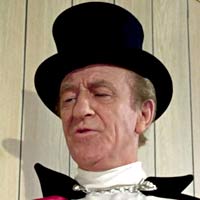 |
|
Image © ITV Studios, 1969 |
| |
Dick Bentley
Character & Episode:
Mesmero in It's Supposed To Be Thicker Than Water
Born: 14/05/1907, Kew, Melbourne, Victoria, Australia (as Charles
Walter Bentley)
Died: 27/08/1995, Camden, London, England
The son of James Walter Bentley, a baker
born in England, and his Australian wife Rose Annie, née Black,
Dick Bentley was educated in Melbourne, Australia, before gaining
employment with the family bakery business. As a teenager, Dick
was an instrumentalist in local dance bands in Australia, having
learned to play the violin from the age of seven. By his own
admission, he wasn't a particularly good violinist, and so he
learnt to play the clarinet and saxophone, too, and also to
sing, his burgeoning versatility keeping him in demand. While still in
his teens he was a regular on the Melbourne cabaret circuit as a
comedian and singer, his act consisting of playing a few bars of
music deliberately badly, interspersed with jokes and legitimate
musical numbers, and by 1927 was a member of the Footwarmers, a
Melbourne-based amateur music ensemble. Soon, he was also a part
of the Australian Broadcasting Commission (ABC) Dance Band, in
which he played both sax and clarinet. In 1936, he had won
himself both a part in a stage musical comedy - Wild Violets
- and a spot in the ABC radio comedy show Oh Quaite! in
which he had an opportunity to demonstrate his skills as a mimic
and musical impressionist.
Dick came to Britain in 1938 and started working
in radio, first on Radio Luxembourg and then on the BBC. When war broke out,
Dick toured in late 1939 in the revue Youth Takes a Bow, and in
April 1940, married Petronella Marcelle ‘Peta’ Curra at Holborn
registry office. The couple moved to Australia later in the
year, with Dick finding work in radio comedy and wrote his own
scripts. He was a big success, becoming one of Australia's
highest paid entertainers. In 1945, Dick went on tour to entertain the troops, mainly in the South Pacific and
New Guinea.
The war over, he returned to Britain in
1947 and
was soon gainfully employed there on radio, compering talent
shows Beginners Please! and Show Time. He also
appeared in Navy Mixture, and then
teamed up with another of its stars, the comedian Jimmy Edwards, in Take It From Here,
which ran from 1947 until 1960. Meanwhile, he kept himself in
the public consciousness in Australia by making three series for
ABC Radio of Gently Bentley, made respectively in 1951,
1955 and 1966.
Dick would occasionally appear on television, and in 1954 had
his own series called And So to Bentley. He would also
appear in a number of Royal Command Performances. On film he
made notable appearances alongside Robert Mitchum in The
Sundowners (1960) and Barry Humphries in The Adventures of Barry
McKenzie (1972), both filmed in Australia. However, his
career undoubtedly dwindled as radio became secondary to
television, but he continued to make appearance, both dramatic
and comedic, on the small screen. His last role was in the popular
comedy series Some Mothers Do 'Ave 'Em as the grandfather
of
Michael Crawford's hapless Frank Spencer character. Dick Bentley died from
Alzheimer's Disease aged 88 in 1995. His wife Peta predeceased
him in 1991; they had no children.
|
|
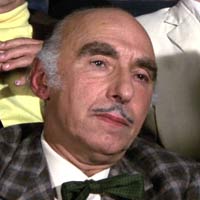 |
|
Image © ITV Studios, 1969 |
| |
Harold Berens
Character & Episode:
Tony Lang in That's How Murder Snowballs
Born: 04/03/1903, Glasgow, Scotland (as Isidor Harold
Berenbaum)
Died: 10/05/1995, London, England
Harold Berens was a
busy supporting character actor whose lengthy screen career
began
in 1944 in the film Candlelight in Algeria. He was also a
comedian and learned his trade in the various theatres
throughout the country.
After Berens left
school, he followed his father’s trade and became a shirt
salesman, building a showbusiness clientele, styling himself as
'Shirtmaker to the Stars'. One of Berens' customers was the
Canadian broadcaster Carroll Levis, who recognised that Berens
had promise as a performer and recommended him for a BBC
audition. Soon he became an entertainer on radio. His earliest
broadcasts were in 1936 as comedy compere to Maurice Winnick and
his Band in outside broadcasts from the Dorchester Hotel. His
big break, fronting his own show on Radio Luxembourg, came in
1939 just two days before the outbreak of the Second World War.
Harold claimed to have
appeared in more than two hundred films but to date he has only
been identified in about a quarter of this total. His main
television and film credits include Man from Tangier (1957), The Avengers
(1962), Danger Man (1965), as an interviewer for the
Tally Ho news sheet in The Prisoner (1967),
Randall and Hopkirk (Deceased) (1969) and Trail of the
Pink Panther (1982). He was also active on radio and
performed in the long running series Ignorance is Bliss.
In 1992 he made his last screen appearance, in Carry On
Columbus as Cecil the torturer, his sole contribution to the
long running film series.
In his personal life, Harold married his secretary, Veronica
O'Connor, on 25th March 1949 in London. The couple divorced in
1960.
|
|
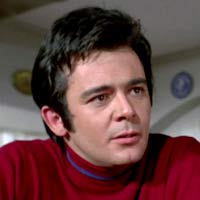 |
|
Image © ITV Studios, 1969 |
| |
Paul Bertoya
Character & Episode:
Jean-Claude in For the Girl Who Has Everything
Born: 08/05/1938, Canada (as Paul Bertoia)
Died: 28/12/1997
Paul Bertoya was a Canadian actor who amassed
fewer than twenty screen credits in his career. Before he became
an actor, Paul worked in a clothing store. In the early 1960s,
harbouring dreams of getting into films, he went to Rome with
his friend, the actor Stephen Young, and once there they sat in
a casting office hoping someone would want to use them. Finally,
they were hired to work on the Joseph L. Mankiewicz film epic,
Cleopatra (1963) starring Elizabeth Taylor, Richard
Burton and Rex Harrison. In Paul's first job as a film extra, he
was catapulted to all extremes of the social structure: one day
he would be shooting arrows at Rex Harrison, the next he would
find himself cast as a Roman slave, and the day after he'd be
lording it as a Roman senator. This baptism of fire led to
further work of the same kind and the money improved too – he
was paid $20 a day on Cleopatra, but was soon receiving $250 a
week (on the 1963 film The Leopard) and then $350 a week
(on the 1963 film 55 Days at Peking).
He made his first
appearance on television in 1964 in an American drama series, The Defenders,
that starred E.G. Marshall. He also
worked in television in his native Canada, on series including
Festival (1964). Before
moving to Britain he also featured in an episode of Mission:
Impossible. His stay in Britain was brief, but in addition
to his role in Randall and Hopkirk (Deceased) he also
appeared in a prominent role as Silvio de Mancini in Man in a Suitcase
(a somewhat bizarre and atypical episode called The Jigsaw
Man), also for ITC, with Richard
Bradford. Paul soon returned to America and would later appear
in series including Mannix, The Mod Squad and Cannon. His last
screen credit was in the French thriller Honeymoon in
1985. He was married to interior designer Gail Kenaston
(1938-1999) – the
adopted daughter of silent film star Billie Dove – from 1965 to
1972.
|
|
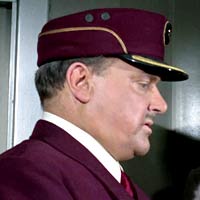 |
|
Image © ITV Studios, 1969 |
| |
Michael Bird
Character & Episode:
Sleeping Car Attendant in A Sentimental Journey
Born: 08/10/1914, Southampton, Hampshire, England
(as Ernest Michael Bayley Bird)
Died: 03/1986, King's Lynn, Norfolk, England
Michael Bird was a supporting actor
who, in a career lasting twenty years from the early Fifties,
amassed more than seventy television and film credits. His
first credit seems to have been in the feature film Vengeance
is Mine (1949). His television debut appears to have been in 1952 in the television programme Jan at the Blue
Fox, a short lived drama series. Later in the decade, he
would appear in other notable series of the time including
The Ambermere Treasure and The Grove Family (which is
generally accepted as being the first British TV soap opera).
Most of his career was confined to television and during the
Sixties he made guest appearances in Steptoe and Son,
Z Cars and Dixon of Dock Green. His later television
appearances were in productions such as Trial (1971),
Turnbull's Finest Half-Hour (1972) and Love Story (1973).
Michael married Rosemary Marriott, a stage
manager, in 1946, and their daughter Antonia Bird (1951-2013)
was a respected film and television director.
|
|
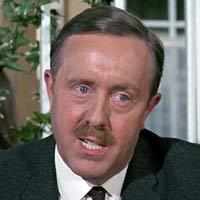 |
|
Image © ITV Studios, 1969 |
| |
Norman Bird
Character & Episode:
Elliot in But What a Sweet Little Room
Born: 30/10/1924, Coalville, Leicestershire, England
(as John George Norman Bird)
Died: 22/04/2005, Wolverhampton, West Midlands, England
Norman Bird was a popular character actor who
in 1990 claimed that Stay Lucky, a comedy series with
Dennis Waterman, marked his 200th TV appearance (although
internet sources list fewer than this). At 16, Bird left school and spent six
months working in an office before studying at the Royal Academy
of Dramatic Art. During the Second World War, he served with the
Royal Air Force, being demobbed in 1947. At RADA he studied with
Richard Attenborough and Bryan Forbes and would remain friends
with them for the rest of his life. He went into theatre and
appeared in repertory companies in Henley-on-Thames, Dundee and
Northampton. In 1950, Norman joined Sir John Gielgud's company,
understudying for Christopher Fry's The Lady's Not For
Burning, which toured the United States. He made his West
End debut in Peter Brook's production of The Winter's Tale
at the Phoenix Theatre in 1951. His first film appearance was as
the foreman in An Inspector Calls (1954). Norman quickly
established himself as a good character actor. Often he had a
moustache and an air of worried resignation - he seemed to
specialise in downtrodden roles. Describing himself as "the man
with the cardigan", his doleful looks ensured that he was
usually cast as henpecked husbands, petty officials or
interfering busybodies.
He had also appeared regularly on radio
and met his wife Nona Blamire (1931-2012), who played Joan Hood in radio's
The Archers. They married in 1953. His main contribution was
to guest in many well-known television series. To name a few,
these included The Avengers, The Baron, The
Saint, Steptoe and Son and Rising Damp. Norman
could play either straight or comedy roles with equal skill. In
1992, he and his wife moved to Bridgnorth, Shropshire, to be
nearer to their two daughters and five grandchildren. Away from
television, he was a quiet family man who enjoyed gardening and
walking.
|
|
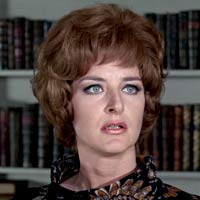 |
|
Image © ITV Studios, 1969 |
| |
Caroline Blakiston
Character & Episode:
Karen Howarth in Never Trust a Ghost
Born: 13/02/1933, Chelsea, London, England (as
Caroline Georgiana Blakiston)
Caroline Blakiston is a fine, RADA-trained
character actress who has worked in repertory theatre the length
and breadth of the United Kingdom, and has been involved in more
than
one hundred screen productions, mainly on television. Her
somewhat aristocratic air was not without reason, as her
parents, Hugh Noel Blakiston and Rachel Georgiana Russell, were
members of the British nobility.
In
her early roles, up until the early Seventies, Caroline tended
to play blondes but later reverted to her natural brown hair.
She was 28 when she made her television debut in 1961 in
Dance with Death, a first series episode of The Avengers,
alongside stars Ian Hendry and Patrick Macnee. A year later she
won her first recurring role on television in the ABC children's
adventure series City Beneath the Sea, playing Dr Ann
Boyd. Her guest appearances include two
further, memorable contributions to The Avengers as well
as an appearance in The Baron.
Her most notable television series
include The Forsyte Saga, The Caesars, The Mallens, Emergency
Ward 10 and the satirical comedy Brass (in which she
featured in all three series as Lady Patience Hardacre). She
also made regular appearances as Aunt Agatha in the BBC remake
of Poldark whilst in her eighties.
She has written a memoir, Black Bread
and Cucumber, which brings together her diaries chronicling
her experiences performing Chekhov in Russian to Russian theatre
audiences. She also adapted these diaries into a one-woman show
which she has taken on tour in the UK, the Middle East, Hong
Kong and, aptly, Russia. She was awarded the Russian Golden
Globe, given annually to foreigners who have made significant
contributions to Russian theatre.
In her personal life, she
married actor Russell Hunter (1925-2004) in 1970. Russell
is well remembered for playing Lonely in Callan, the
1967-1972 spy series which also starred Edward Woodward. She and
Russell had met when they appeared together in A Midsummer
Night's Dream at the Open Air Theatre, Regent's Park, in
1966. The couple
had two children – Adam Hunter and Charlotte Hunter – but ended up divorcing
in 1979. Perhaps her most
notable film appearance was as Mon Mothma in Star Wars: Episode VI – Return
of the Jedi in 1983.
|
|
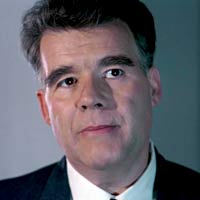 |
|
Image © ITV Studios, 1969 |
| |
Joby Blanshard
Character & Episode:
Police Inspector in But What a Sweet Little Room
Born: 07/11/1919, Beverley, Yorkshire, England (as
John Henry Blanshard)
Died: 26/11/1992, Tunbridge Wells, Kent, England
A busy character actor for
forty years from the mid-Forties, Joby Blanshard initially concentrated on
stage work as a member of Theatre Workshop, acting to begin with
under his real name John Blanshard. From the 1950s, he turned
his attention far more towards television and would guest star and appear as a regular in a
number of well-known series. The most prominent of these
included Coronation Street, Z Cars, Doomwatch,
The Brothers and When The Boat Comes In. His last
screen credit was in 1986 when he had a minor role in First Among
Equals, a series which starred Jeremy Child and Clive Swift.
In his personal life, Joby was twice
married. His first marriage, to Carolyn Maldarelli of New York
in 1949, lasted only until 1953 and ended in divorce. He
remarried in 1956, to Isabel Sutherland (1921-1988), a noted
Edinburgh-born singer and of the post-war British Folk Revival
and a pioneer of the Lowland Scots unaccompanied style of
ballad-singing in London folk clubs. She and Joby became
collectors, particularly in the North-East of Scotland, and
their recordings are deposited in the Folktrax Archive.
|
|
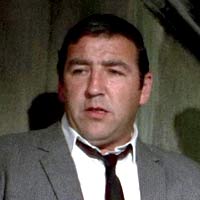 |
|
Image © ITV Studios, 1969 |
| |
Jim Bolton
Character & Episode:
1st Man on Stairs in A Sentimental Journey
Jim Bolton was an often seen background
actor with many uncredited screen roles to his name. It would
seem that his only credited screen roles are as Abdullah in
The Legions of Ammak, an episode of the ITC television
series The Baron, a barman in one episode of the
marketplace soap opera Honey Lane and as a heavy in the
film Go For A Take (1972), which featured Reg Varney and
Norman Rossington in the lead roles.
|
|
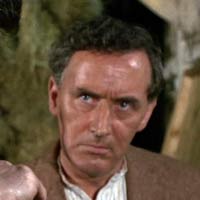 |
|
Image © ITV Studios, 1969 |
| |
John Bott
Character & Episode:
Joe Dyson in The Smile Behind the Veil
Born: 28/03/1923, Douglas, Isle of Man (as John
Ronald Henry Bott)
Died: 03/05/1994, Washington, USA
John Bott worked occasionally as a
supporting actor, joining the profession in early middle age and
making his first screen appearance in the mid-1960s. Prior to this he worked in several other
trades; one such job was as a travel agent, while another was as
a BBC radio presenter on the topical agricultural weekly series
Farm Fare in 1955 for the BBC Home Service. John would appear
regularly,
mainly on radio and the stage with occasional television
appearances, for the rest of his career.
He made his theatrical debut in weekly
repertory theatre at the Bath Theatre Royal. Further 'rep'
seasons followed in Northampton and Worcester and these led to
his West End debut when he joined the cast of Conduct Unbecoming
at the Queen's Theatre. He spent six years with the acclaimed
Royal Shakespeare Company, with whom he made his Broadway debut
in November 1974 as the Count von Stalburg in Sherlock Holmes
at the Broadhurst Theatre, and toured with them again to New
York in Tom Stoppard's Travesties. Major stage roles
followed at the Oxford Playhouse, Bristol Old Vic, Greenwich
Theatre, Birmingham Rep and The Watermill, Newbury, as well as
in Vienna and Hong Kong.
On radio, he was for some time a member of the BBC Radio Drama
Company and became a well-known radio voice for his two roles in
the long-running BBC soap opera The Archers, as Paddy
Redmond and John Tregorran. In 1987 he starred in a one-man show
for BBC Radio 3, Man from Mann, about the Manx poet
Thomas Edward Brown.
His television credits are not expansive
but he did make
notable contributions to the likes of Crossroads, Churchill's People,
Anna of the Five Towns, The
Chinese Detective (as series regular Detective Chief
Superintendent Halsey) and Cover Her Face (another
regular role, as the Reverend Bernard Hicks).
John died of a heart attack whilst in
America in 1994. His son Michael (born 1954), daughter Rosamunde
(born 1959) and daughter-in-law all went into showbusiness and his wife
was a painter.
|
|
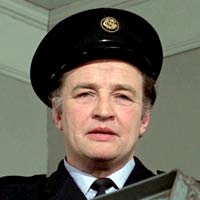 |
|
Image © ITV Studios, 1969 |
| |
Tom Bowman
Character & Episode:
Security Man in
Money to Burn
Born: 14/11/1920,
Liverpool, England (as Thomas Horne Bowman)
Died: 08/01/1997, Banbury, Oxfordshire, England
Tom Bowman was a bit part actor who started his
screen career in the first half of the 1950s. His earliest
identified role dates back to 1954 and the film Dangerous Cargo,
in which he appeared without screen credit as a policeman. For the next twenty years,
besides being employed on radio and stage, he would appear also
on television, generally in small roles. Tom's notable
contributions were to series including Richard the Lionheart
(1962), Doctor Who (1966) and Z Cars (1968 and 1969).
One of his last appearances was in The Magical World of Walt
Disney in 1974.
|
|
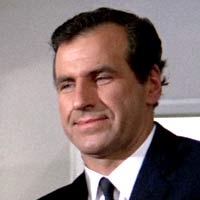 |
|
Image © ITV Studios, 1969 |
| |
Peter Brace
Character & Episode:
1st Henchman in A Sentimental Journey
Born: 30/08/1924, Weston-super-Mare, Somerset, England
Died: 29/10/2018
Peter Brace, well-known as a stuntman,
started his screen career as an extra. He made his first
appearance in Ken Annakin's Holiday Camp (1947) and over
the next few years appeared in such films as Dick Barton:
Special Agent (1948) and It's Not Cricket (1949). His
path to becoming as a stuntman started when he went to play an
archer in Ivanhoe (1952) and saw stuntman Paddy Ryan
diving from the top of a tower into a shallow pool for that
film. Soon, Peter became a sought-after stuntman, although he
did not have a speciality due in part to his towering height
(6ft 4in tall).
During his career Peter appeared in many
notable series such as Danger Man, The Avengers,
The Prisoner, Man in a Suitcase and The New
Avengers. He also appeared in a succession of films
including A Night to Remember (1958), Goldfinger
(1964) and The Curse of the Pink Panther (1983). His
final credited role was as a huntsman in the television series
She-Wolf of London in 1990. A talented swordsman, he
spent many years with a team of stuntmen who travelled the world
putting on jousting displays. He passed away in October 2018 at
the grand old age of 94. He was survived by his former wife
Patricia Murphy, whom he married in 1957, partner Wendy, son
David, daughter Tina, five grandchildren and two great
grandchildren.
|
|
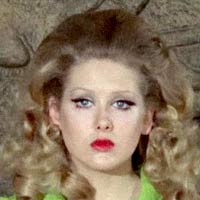 |
|
Image © ITV Studios, 1969 |
| |
Penny Brahms
Character & Episode:
Girl in Luxury Flat in When the Spirit Moves You
Born: 1951, Hampstead, London, England (as Penelope Brams)
Penny Brahms was a photographic
model and film and television actress of the 1960s and 1970s,
who was often employed to add glamour to a production. Her most
notable appearance feature in the films 2001: A Space Odyssey
(1968), Dracula A.D. 1972 (1972), Games That Lovers
Play (1971) and Percy (1971), in which she is seen a
supporter at a football match.
Penny has, it seems, been married four
times. Her first marriage was to property dealer Clive Raphael,
who died in a plane
crash in central France on 6th March 1971, allegedly leaving her just a shilling and some
nude photographs of herself – the Will was later
discovered to have been forged by an unscrupulous 'friend'.
Brahms remarried in 1972. Her second husband, playboy and
amateur jockey Michael 'Dandy Kim' Caborn-Waterfield, owned the
first Ann Summers shop, near Marble Arch, which he named after a
former girlfriend. The couple had a daughter, but the marriage
did not last. She moved to Paris, where she reinvented herself
as 'Jamais' and resumed her modelling career. Now, she fell in
love with American oil entrepreneur, David Lyons, and the pair
married and based themselves in the USA, where they enjoyed a
reckless lifestyle. Unfortunately, he was deemed to have
committed fraud and the couple went on the run, with a warrant
out for his arrest. Lyons ended up in jail and the marriage
again, was dissolved. Her fourth marriage was to Jeremy Scott, a
scriptwriter who wrote for British television series including
The Avengers.
|
|
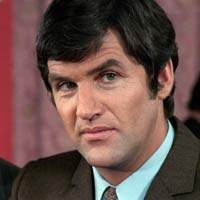 |
|
Image © ITV Studios, 1969 |
| |
Edward Brayshaw
Character & Episode:
Paul Lang in The Trouble With Women
Born: 18/10/1933, Central Coast, New South Wales, Australia (as
Edward John Brayshaw)
Died: 28/12/1990, London, England
Edward Brayshaw was a dependable character actor, and in
his younger days, blessed with striking good looks. He was born
in 1933 in Australia but was actually brought up in New Zealand. Edward made his
screen debut during the 1950s, with one of his early roles coming in
1957 in the television play Sound of Thunder for
Australian state broadcaster ABC. Between then and 1963 he appeared in a number of largely
forgotten television plays. His first well-remembered role was
as the lead Harry Brent in the thriller series A Man Called
Harry Brent in 1965; the series also featured a young Gerald
Harper. The following year, Edward played Rochefort in the serial
The Three Musketeers (1966-67), which featured early roles for
Jeremy Brett and Brian Blessed. Edward would also feature in its
sequel,
The Further Adventures of the Three Musketeers, in 1967.
Other guest appearances included in two Doctor Who serials (The
Reign of Terror and The War Games), The Champions
and in 1975 he was cast as Harold Meaker in the children's
television series Rentaghost. By now, Edward was rapidly
putting on weight and perhaps sadly it is for his Rentaghost role
that he is perhaps best remembered today.
Sadly, little is known
of his personal life. He made his final screen appearance in
Uncle Jack and Operation Green, a family fantasy series.
Edward would die later that year of throat cancer, aged just
fifty-seven; a memorable actor who sadly faded away too early
after a promising start.
|
|
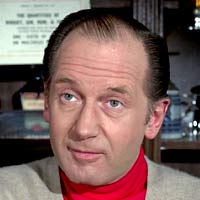 |
|
Image © ITV Studios, 1969 |
| |
James Bree
Character & Episode:
Mullett in The Man from Nowhere
Born: 20/07/1923, East Coker, Somerset, England (as
James Rutherfoord Worsfold Thomson)
Died: 01/12/2008, London, England
Growing up, James Bree was educated at Radley
College near Abingdon, Oxfordshire, and during the Second World
War served in the Royal Air Force. From 1947 to 1949 trained as an actor
at the Central School of Speech and Drama, where he won the
Fogarty Prize for Best Performance. Despite not being a
well-known face, James' television and film career spanned
more than forty years, during which time he featured in well over
one hundred and fifty film and television productions, although
many of his roles were minor. James however did contribute to a
number of well-known series, including The Money Man
(1958), The Prisoner (1967), The Newcomers (1967),
The Avengers (two episodes in 1963 and 1968), The
Persuaders! (1971), The Donati Conspiracy (1973), Secret Army (1977), The Jewel
in the Crown (1984) and several guest appearances in
Doctor Who (The War Games, 1969; Full Circle, 1980;
The Trial of a Time Lord, 1986). He seems to have made his
television debut in 1953 in the BBC's Harlequinade, written by
Terence Rattigan in which he appeared as Tom Palmer.
On film he made an excellent contribution to
the James Bond movie
On Her Majesty’s Secret Service (1969), although his
performance as Blofeld's attorney Gumbold would fall victim to
the editor's scissors and was excised from initial home video
and television editions. Fortunately, it would later be
reinstated for the film's DVD and Blu-ray releases.
James later would appear at several
Doctor Who and The Prisoner conventions and took part
in several fan-made video documentaries investigating the
production and legacy of The Prisoner.
In his personal life, James added 'Bree' to
his surname after inheriting some Warwickshire land from
Archdeacon William Bree, his great Uncle. James was a founder
member of Peter Hall’s Royal Shakespeare Company, set up in
1960, and he was also a good friend of Peter Cushing. Sadly,
James’ last decade of life was in poor health after a stroke
left him without the power of speech and forced his retirement
from the acting profession.
|
|
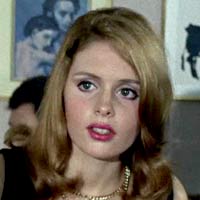 |
|
Image © ITV Studios, 1969 |
| |
Susan Brodrick
Character & Episode:
Carol in Who Killed Cock Robin?
Born: 27/03/1945, Hampstead, London, England (as
Susan Margaret Brodrick)
Susan Brodrick trained as an actress at
London's Central School of Speech and Drama, graduating in 1966. Her screen
career began in the same year when she appeared in Michelangelo
Antonioni's mystery thriller Blow-Up. Susan also featured
in Z Cars, Department S and Jason King,
sometimes credited - incorrectly - as Susan Broderick. One
of more prominent roles was as Kate Nickleby in the television
series Nicholas Nickleby in 1968. Susan also had minor
roles in two horror movies, Countess Dracula and Dr
Jekyll and Sister Hyde (both 1971). Her last screen
credit was in the television movie The Winter's Tale in
1981.
In her personal life, she was married to
actor Robert Swann (1945-2006), with whom she had three
children: Tabitha (born 1972), Benedick (b. 1976) and Jessica
(b. 1978).
|
|
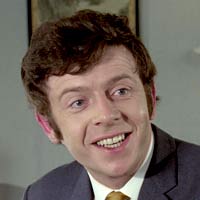 |
|
Image © ITV Studios, 1969 |
| |
Ray Brooks
Character & Episode:
Marty in The Man from Nowhere
Born: 20/04/1939, Brighton, East Sussex, England (as
Raymond Michael Brooks)
At the age of 16, Ray Brooks became the assistant
manager of a theatre but it was an acting career that he really
wanted to pursue. He quickly graduated to the stage, and since
has appeared in many top theatre productions such as Snap
and Absent Friends. In the late 1950s he won his first film role in
the controversial John Krish drama Captured, a
hard-hitting film about Korean War prisoners of war which was
banned and not seen in public until a Krish retrospective event
at the National Film Theatre, now renamed the BFI Southbank, in 2003 (later, in 2013, the BFI released it on disc).
Ray's television debut a year later in
The Secret Kingdom for the BBC was thankfully less troubled.
He appeared in five episodes of this serial as Figgins. During 1963
and 1964 he was a regular cast member alongside Sid James in two
series of the sitcom
Taxi! and the legendary
ITV soap opera Coronation Street, in which he appeared
intermittently between December 1963 and October
1964 as Norman Phillips, the nephew of talent agent Lenny
Phillips. In 1965 he got his first big break in the Richard
Lester film The Knack… and How to Get It, in which he had
a prominent role alongside Michael Crawford and Rita Tushingham.
The following year he appeared in Daleks - Invasion Earth
2150 A.D., the second big screen outing for television's
Doctor Who, with Peter Cushing and Bernard Cribbins. Later
that year he appeared in the controversial play Cathy Come
Home as Reg Ward with Carol White, a landmark role which
cemented his reputation.
From the late 1960s onwards, Ray began
developing his career in voice work, especially for commercials.
He also released an album of songs entitled Lend Me Some of
Your Time (Polydor, 1971), though this was not a commercial
success. However, he used his voice to arguably better effect in
nine weeks' worth of episodes as storyteller on Jackanory
between 1969 and 1979. It was in 1971 that he narrated the
immensely popular children’s television series Mr Benn.
Later, in 1985, he was narrator for The Pickwick Papers,
a twelve-week BBC Classic Serial adaptation of the Charles
Dickens novel.
He made one appearance in the Carry On
series, as Georgio, who has a one-night stand with June
Whitfield’s character in Carry On Abroad (1972). Ray
continued in supporting roles on television until 1983 when he
played Robbie Box, the central character in Big Deal,
which ran for thirty episodes until 1986 and starred Sharon Duce
as his screen wife.
He has appeared infrequently on television
since 1994 but has continued to make commercial
voice-overs. He reappeared in 2006 in EastEnders and
played Joe Mercer, who married the character played by former
Are You Being Served? actress Wendy Richard. On her
departure he was written out of the series in early 2007, having
made well over one hundred appearances in the soap. In recent
years he has also written several books, the first of which
was his autobiography Learning My Lines: An Actor's Life
(Book Guild Publishing, 2009), followed by the novel Echoes
(released in 2012). Ray has been
married since 1963 to Sadie Elcombe and has three children. One of his sons,
Will, was a football journalist. Sadly his daughter Emmy died in
2003. Ray has a website:
www.raybrooksbooks.com.
|
|
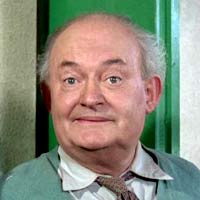 |
|
Image © ITV Studios, 1969 |
| |
Arthur Brough
Character & Episode:
Snowy in That's How Murder Snowballs
Born: 26/02/1905, Petersfield, Hampshire, England (as
Frederick Arthur Baker)
Died: 28/05/1978, Folkestone, Kent, England
A
late starter in television who made his debut aged 50 in 1956
when he appeared in BBC’s Sunday Night Theatre, Arthur
Brough had by then worked in theatre more than twenty-five
years. Over the next twenty years he would appear mainly on
television in more than seventy productions. He will be best remembered
for his role as Mr Ernest Grainger in the long running BBC
comedy Are You Being Served? (1972 to 1977), and also
featured in its feature film spin-off, though sadly he died not
long after filming was complete.
Originally, Arthur wanted to become a teacher but, unable to
break into the profession, he ended up in a solicitor’s office.
Unhappy with this, Arthur joined an amateur dramatic society and
would later attend RADA, graduating in 1928. It was while in a theatre troupe that
he met his wife Elizabeth Addyman. The couple would marry in
1929 and remain together until her death in early 1978. Their
daughter, Joanna Hutton, became the first female curator of the
Bronte Parsonage Museum in Haworth, during the 1960s.
Arthur created his own drama company in Folkestone and later
would establish new repertory companies in Bradford, Blackpool,
Keighley, Leeds and Southampton, as well as tour all over the
country. The war put a halt to his activities and he enlisted in
the Royal Navy; he helped with the evacuation of Dunkirk, his
ship returning to the rescue soldiers stranded on the beach
several times. After the war, he went back to Folkestone to
resume his theatre career. He had a company called The Arthur
Brough Players and helped many actors get their first breaks in
theatre these included Peter Barkworth (The Power Game),
Polly James (The Liver Birds), Anne Stallybrass (The
Onedin Line), Barry Morse (Space: 1999) and Trevor
Bannister, who would later appear with him in Are You Being
Served?
The
mid-Fifties, a boom period in the industry, saw Arthur move into
films and then television. One of his first jobs away from the
stage was the film The Green Man (1956) with Alastair
Sim, in which he played the landlord of the eponymous hotel. He
had a minor role opposite Jayne Mansfield in the 1960 film
The Challenge, and went on to make guest appearances in TV
shows such as Upstairs, Downstairs, Dad's Army,
Z Cars, The Persuaders! and Jason King. He
also continued to appear in theatrical productions, including
Half a Sixpence (1967), playing a shopkeeper. The Folkestone
Rep continued until 1969, closing when Arthur’s wife Elizabeth
began to suffer ill-health.
In
the early 1970s, Arthur was cast as Ernest Grainger in the BBC situation
comedy Are You Being Served?, written by Jeremy Lloyd and
David Croft. Initially a one-off entry in the Comedy
Playhouse strand (transmitted 8th September 1972), it was well-received and commissioned for
a series in May 1973. Set in an outdated department store,
Brough played the senior menswear salesman, with assistants Mr
Humphries (John Inman) and Mr Lucas (Trevor Bannister). The show
became enormously popular and ran until 1985, well after
Arthur's death. It was after the death of his wife that a
devastated Arthur said that he would quit acting. However, he
only lasted another six weeks himself. Apparently, Arthur was
quite a character, often pulling pranks on his fellow actors. He
was, though, popular with his fellow professionals and at the
time of his death all spoke well of him.
|
|
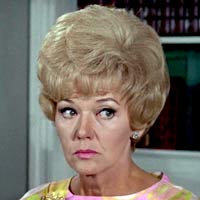 |
|
Image © ITV Studios, 1969 |
| |
Gabrielle Brune
Character & Episode:
Mrs Gabrielle Howe in Who Killed Cock Robin?
Born: 12/02/1912, Bournemouth, Dorset, England (as
Gabrielle May Hudson)
Died: 18/01/2005, Chichester, Sussex, England
Although Gabrielle Brune had a long
career (lasting nearly fifty years) her work was confined mainly
to the theatre. She registered more than thirty television and film
credits during her lifetime, making her feature film debut in 1930 in the
crime drama Red Pearls. Her first radio appearance
followed in August 1934 on the BBC National Programme in the
musical comedy operetta Wild Violets, and in 1939 she
registered her first credited television role in the BBC's
The Gate Revue. Her stage name was arrived at by adopting her
mother's maiden name, Brune (her mother was an actress and
singer, Adrienne - originally Phyllis Caroline - Brune).
In the early Fifties, Gabrielle contributed to
several feature films, most notably Mandy
(1952), The Titfield Thunderbolt (1953) and Three
Steps to the Gallows (1953). From the Sixties to the end of
her career she generally made cameos in television series. Her
later television work included appearances in productions such
as Crown Court (1974), Anglia Television's play Goose
with Pepper (1975) and Raffles (1977), a popular
series based on E. W. Hornung's stories about the criminal
adventures of a gentleman thief.
In her personal life, Gabrielle appears to
have been married three times, with her first marriage in 1935
having been to the actor Raymond Francis (1911-1987). The actor
performed under a stage name, his real one being Reginald George
Thompson, and hence Gabrielle at times referred to herself as
'Mrs G.M. Thompson'. One such occasion was in 1938 when she was
interviewed about her first professional trip to the USA in a
report that appeared in the
Brooklyn Daily Eagle on 20th April 1938. Though the marriage
was over by the early 1940s, Raymond Francis went on to enjoy
television fame as Detective Police Superintendent Lockhart in
the three connected series Murder Bag, Crime Sheet
and No Hiding Place between 1957 and 1967. Both Gabrielle
and Raymond would remarry.
Gabrielle's second marriage was in 1942 to an American Army officer,
Major Walter J. Currie (1903-1977) in London, and her third in April 1947 to Paul
Humphrey Armytage Bowman (1921-2003), the 5th Baronet Bowman of
Holmbury St. Mary. Gabrielle and Paul divorced in 1974; the
marriage produced one child, a daughter, Amanda, born in 1946.
|
|
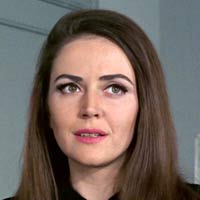 |
|
Image © ITV Studios, 1969 |
| |
Denise Buckley
Character & Episode:
Susan Lang in The Trouble With Women
Born: 26/04/1945, Abergavenny, Wales (as Elizabeth
Denise Buckley)
Denise Buckley studied at the Guildhall School of Music and Drama.
Her
earliest known screen appearance was in the popular medical
drama series Emergency
Ward 10 in 1965, although she had previously made a credited
appearance in
Man with a Mission, an episode of Six of the Best
that was made but ultimately not transmitted. Over the next fifteen years, she would make
around forty film and television contributions, including most
notably in The Wednesday Play (Dennis Potter's Where the
Buffalo Roam), The Prisoner, The Avengers,
Department S and Tycoon. Her last screen appearance
was in 1982 in the drama series Ennal's Point which
starred Philip Madoc. Denise has been married since 1970 to
Scott Marshall, a casting agent, and the couple have
two children, Liza Marshall, who became a television producer,
and son Jesse.
|
|
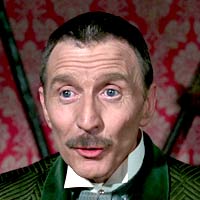 |
|
Image © ITV Studios, 1969 |
| |
Alfred Burke
Character & Episode:
Henry Foster in All Work and No Pay
Born: 28/02/1918, Peckham, London, England
Died: 16/02/2011, Barnes, London, England
Known throughout his life as Alfie
to friends and colleagues, Alfred Burke was born in south east
London to Irish parents and was educated at Leo Street Boys'
School and Waltham Central School. He left school in 1933 to
take a job as an office boy with a firm that specialised in
repairing railway wagons. Soon afterwards he became a steward in
a City club for businessmen, but left after an uncharacteristic
dispute with a barmaid which ended with her squirting a soda
siphon in his face.
He dared not tell his parents that
he was out of work, so he ran away to Brighton, returning to
London to take a job in a silk warehouse in Cheapside. He began
to perform with a local amateur dramatic group run by a
headteacher who persuaded him to apply for a London county
council scholarship to RADA. He took up his place in 1937.
Two years later he appeared on
stage professionally for the first time, in The Universal
Legacy at the Barn Theatre in Shere, Surrey. The Second
World War then intervened. Alfie registered as a conscientious
objector, and was directed to work on the land. After the war,
he went back to theatre work at Farnham, Surrey, where he met
Barbara Bonelle, a stage manager, who became his wife.
In the late 1940s, he joined the
Young Vic company and went on to spend time in Manchester at the
Library Theatre, at the Nottingham Playhouse and in London,
appearing in Pablo Picasso's play Desire Caught By the Tail
at the Watergate Theatre. He was at Birmingham Rep for the three
parts of Henry IV, which transferred to the Old Vic in
London in 1953.
Alfie made his screen debut as an
uncredited dancer in The Kid from Brooklyn in 1946, but
it would be not until 1955 that he again featured on the screen.
From then until his final role as Professor Armando Dippett in
Harry Potter and the Chamber of Secrets in 2002, Alfred
would notch up more than one hundred and sixty television and film credits.
By the late 1950s, Burke had
established himself as a stage actor and a character actor in
films such as Bitter Victory (1957) and No Time to Die
(1958). He played the industrial agitator Travers in The
Angry Silence (1960), in which a worker (Richard
Attenborough) is shunned by his colleagues for refusing to take
part in a strike. In 1964 he appeared in the science-fiction
movie Children of the Damned, a sequel to Village of
the Damned (1960).
On TV, he took guest roles in
The Saint (two episodes, 1963 and 1964), The Avengers
(three episodes, 1961, 1962 and 1966) and Z Cars (two
episodes, 1962 and 1964), as well as six Armchair Theatres
and 13 editions of ITV's Play of the Week. In 1964 his
own script, Where Are They Now?, written under the pen
name of Frank Hanna, was produced as a Play of the Week.
The following year, he slid into
the arms of a welcoming public as Frank Marker - the eponymous
Public Eye - a fascinating, career-defining role for ABC
Television (and later Thames Television). His portrayal of the
down-at-heel private eye, more Jeff Randall than John Steed -
quite unglamorous and down to earth - made the series one of the
most popular and highly rated dramas on British television. When
what survived of the show (most of the ABC episodes are lost)
was released on DVD between 2004 and 2009 by Network, it
prompted a small-scale reappraisal of this long forgotten
series, and many commentators now regard Alfie's performances as
Marker as being among the very best seen in the golden age of
British TV.
In between his commitments to
Public Eye, Alfie had leading roles at the Leeds Playhouse
in Luigi Pirandello's Henry IV, in 1970, and in
Pictures in a Bath of Acid, as the writer August Strindberg,
in 1971.
Later television roles included
regular roles in several television series which included The
Brontës of Haworth (1973), all 26 episodes of the wartime
drama Enemy at the Door (1978-80) and The Borgias
in 1981. From the mid-Eighties, his work output slowed
considerably, though he still made occasional appearances on
film, stage and television, and appeared at television
retrospectives. From his marriage to Barbara Bonelle he had two
sets of twins: Jacob and Harriet (born 1956) and Kelly and
Louisa (b. 1960). Alfie died of a chest infection at the ripe old
age of 92; three years earlier he had made his final stage
appearance, as the Shepherd in a new version - by Frank
McGuinness - of Sophocles' Oedipus at the National
Theatre. A life well lived, a career much admired.
|
Section compiled by Darren Senior
Additional research and presentation by Denis Kirsanov and Alan Hayes
|
|
|
Back to Top |
|



